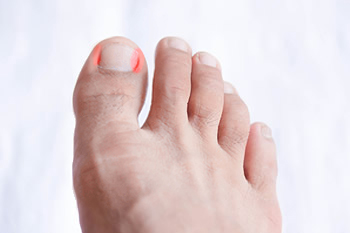 An ingrown toenail is defined as a nail that grows into the outside edges of the skin. It generally affects the big toe and can cause severe pain and discomfort. It can occur as a result of wearing shoes that do not have adequate room for the toes to move freely in, or possibly from genetic factors. Additionally, the shape of the nail may be conducive to developing an ingrown toenail. Research has indicated that ingrown toenails may happen more often in children and pregnant women. This can be a result of the accelerated speed of the nail growth. Mild relief may be found when the affected toe is soaked in warm water which can be beneficial in pulling the nail away from the softened skin. An ingrown toenail can easily become infected if not promptly treated. If you are afflicted with this ailment it is strongly suggested that you speak with a podiatrist who can properly treat this condition.
An ingrown toenail is defined as a nail that grows into the outside edges of the skin. It generally affects the big toe and can cause severe pain and discomfort. It can occur as a result of wearing shoes that do not have adequate room for the toes to move freely in, or possibly from genetic factors. Additionally, the shape of the nail may be conducive to developing an ingrown toenail. Research has indicated that ingrown toenails may happen more often in children and pregnant women. This can be a result of the accelerated speed of the nail growth. Mild relief may be found when the affected toe is soaked in warm water which can be beneficial in pulling the nail away from the softened skin. An ingrown toenail can easily become infected if not promptly treated. If you are afflicted with this ailment it is strongly suggested that you speak with a podiatrist who can properly treat this condition.
Ingrown toenails may initially present themselves as a minor discomfort, but they may progress into an infection in the skin without proper treatment. For more information about ingrown toenails, contact Dr. Richard DiMario of Maine. Our doctor can provide the care you need to keep you pain-free and on your feet.
Ingrown Toenails
Ingrown toenails are caused when the corner or side of a toenail grows into the soft flesh surrounding it. They often result in redness, swelling, pain, and in some cases, infection. This condition typically affects the big toe and may recur if it is not treated properly.
Causes
You are more likely to develop an ingrown toenail if you are obese, have diabetes, arthritis, or have any fungal infection in your nails. Additionally, people who have foot or toe deformities are at a higher risk of developing an ingrown toenail.
Symptoms
Some symptoms of ingrown toenails are redness, swelling, and pain. In rare cases, there may be a yellowish drainage coming from the nail.
Treatment
Ignoring an ingrown toenail can have serious complications. Infections of the nail border can progress to a deeper soft-tissue infection, which can then turn into a bone infection. You should always speak with your podiatrist if you suspect you have an ingrown toenail, especially if you have diabetes or poor circulation.
If you have any questions, please feel free to contact our office located in York, ME . We offer the newest diagnostic and treatment technologies for all your foot care needs.